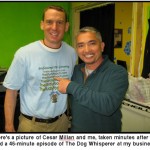Our content is reader supported, which means when you buy from links you click on, we may earn a commission.
7 Copywriting Tips From the Pros

Copywriting can be very challenging.
It’s hard to know the exact words to use. What should you say to get your prospects excited enough about your products and services to buy? Where is the line drawn between being too hype-y and not saying enough?
Copywriting is something I’ve struggled with.
So I went to the pros for come copywriting tips and will share them with you here.
What do the pros think about when writing copy?
Here are 7 copywriting tips shared by top copywriters.

#1. Michel Fortin: Perfect Prospect Profile
Writer’s block happens when you ignore the most important element in your copy. That element is not the headline, the price, the bullets, the guarantee, or the order form. *It’s the market.*
That’s why the best way to beat writer’s block is to conduct *market research*. Learn as much as you can about your market. The more you know, the more ideas will jump out at you and flow onto your copy.
If you’re still stuck, you need to research some more. Ask open-ended, qualifying questions. Get as much information as possible. And develop a buyer’s persona (or what I call the “perfect prospect profile”).
Just like profilers do on TV police dramas, develop a physical and psychological profile of who would be the perfect person to buy your product or service. And then, write to that one individual.
One way is to interview happy customers. Get them enthused. Poke, probe, and prod as much information as you can. Have them try to sell you on their purchase.
Then, transcribe your interview. Your copy will practically write itself this way.
Bottom line, when writing copy the vast majority of your time should be spent on studying, researching, and learning from your market. Not writing.
Michel Fortin, MichelFortin.com and SuccessDoctor.com

#2. Drayton Bird: Be Succinct
“Bad copy tends to get to the point too late – and finish too soon.”
Drayton Bird, DraytonBird.com and DraytonbirdCommonsense.com
(This tip is short, but there’s a lot to it. The legendary Drayton Bird seems to have given me a copywriting tip that also serves as an example for exactly what he was trying to get across.)

#3. David Babineau: Do Your Research
If You Want to Write Better Copy … Forget About the Writing!
Good copywriting is said to be more about good salesmanship than good writing.
I agree. But what is the key to good salesmanship?
If you drill down deep enough, I believe you’ll find the answer lies in one single word: research.
You see, to sell successfully, you must know so much about your prospect he or she will believe you peeked inside their head. You must also know so much about your product or service, people will instantly recognize you as an expert.
And knowledge requires research.
Now, if you already know your market and product inside-out, perfect. That will make the job a whole lot easier. (For example, I was once hired to sell a product in a field I was intimately familiar with. As a result, I banged out an email in under a day that helped generate over $15,000 in sales for my client.)
But other times, it’s much different…

Here’s a stack of papers and articles I read for a project I recently completed.
(The yellow notepads are part of 250+ pages of handwritten notes I took down during my research). While this may seem excessive, I felt this is what I needed to do in order to write a killer promo.
But don’t lose heart.
The good news about research is that it isn’t overly complicated to do (it just takes a bit of time!)
Here are three things you can (and should) do to kick-start your research:
- Go to a bookstore and browse all the books and magazines on the subject you’re writing on. Then buy and read several of them.
- Figure out what your customers or prospects think about competitive products — you can do this by hitting up the online forums or perusing book reviews on Amazon.com (for a great take on this by the legendary marketer Jay Abraham, take a look at this 10-minute video: http:// www.youtube.com/watch?v=mlTbmqyvurs).
- Talk to your customers! (If you don’t have customers yet, talk to people would be your most likely purchasers.)
Listen, research may or may not seem like fun to you, but it’s an indispensable part of your job if you intend to get the most out of your sales copy.
For example, earlier this year I was hired to write a half-page ad for a new technology product. The client, who wanted to test two versions, also wrote his own separate ad and then ran the two ads in 2 major U.S. newspapers.
While both our ads touched on the major pain points of the market, my copy really emphasized on specific information I’d learned throughout my research (e.g. I touched upon 19 different things they could do with the product… the exact dollar figure—$836 per year—they’d save by switching to our solution… and I also included several quotes from experts in the field, while my client’s ad featured none).
The result? My ad out-pulled the other ad by a factor of 32 to 1.
I mention this not to brag, but rather, to drive home the importance of good research.
You’ll see that once you are armed with this powerful tool, the writing becomes the easy part.
David Babineau, DavidBabineau.com

#4. Mel Henson: Cut Out One Word to Make Your Copy Stronger
Cut out the word ‘will’ and suddenly your copy is much more powerful.
So, instead of saying, “Dogs will love the meaty taste”, say, “Dogs love the meaty taste”.
It sounds so much more believable in because it’s in the present tense. To the subconscious brain, that makes it seem more real, as if they are living it right now, rather than a vague promise of something in the future.
Mel Henson, WordsThatSell.co.uk

#5. Mark Andrews: Identify One Single Emotion
When writing sales copy remember every single word you write…
Every single sentence you put together…
Every single paragraph you construct will affect the emotions of the reader.
So ask yourself even before you commit pen to paper… what is the one single emotion you want to elicit from the person reading your sales copy?
When you get this right, you’ll be automatically positioning your solution, your product or service as the most viable option to take action on instantly.
What you want is to direct the reader in to a direct call to action of your choosing. Send the reader through a whole rollercoaster ride of emotions with confusing words and chances are the potential buyer will head off elsewhere in search of the solution they’re looking for. But get it right, concentrating with a laser like focus on bringing to the fore just one core emotion and you’ll have the reader feeding from the palm of your hand.
Keep your wording simple and conversational in style. Remember the person reading your sales copy has thoughts, feelings, and emotions – just like you. Treat your readers, your website visitors as you yourself like to be treated. Give them respect by providing for them exactly the wording which they want to ‘hear’ in their own mind as it relates to the solution they’re seeking a remedy for.
Do this and there’s a very good chance you’ll have this individual buying from you again and again.
Mark Andrews, IMCopywriting.com

#6. Roger Dooley: Use Adjectives
Use adjectives, but use the right kind of adjectives.
Research shows that adjectives that are vivid and sensory increase sales. Sensory adjectives in particular are important – even when they are used as metaphors, as in, “I had a rough day,” our brains light up as if we were feeling a rough surface.
Roger Dooley, NeuroscienceMarketing.com

#7. Wesley Murph: Who’s It Coming From?
It’s all about the market.
Great sales copy will not do a darn thing unless the market wants (and will willing to spend money on) whatever it is you want to sell. So before anyone goes about writing a lick of sales copy, they need to make sure their product or service really is something people want and will spend money on.
Less hypey benefits.
Today’s customers are savvy. Very savvy. They’ve heard every sales pitch every which way till Tuesday. So the moment they feel they’re being barraged with benefit-heavy sales copy, is the moment they shut down.
I’m not saying not to use benefits. On the contrary. Benefits for sales copy are like oxygen to the lungs. But today’s copywriter must be very careful with saying too many things that are too outrageous. In fact, I’ve found that being a bit more subtle works better than being to over the top.
Proof marketing.
Sales copy today must be backed up with a heaping dose of proof because consumers are skeptical. As a result, the copywriter must inject a proof element (like testimonials, a demonstration, a media appearance, a celebrity endorsement, specificity, etc.) to back up every claim they make.
No proof (or weak proof) = no sale.
Credibility of the spokesperson.
And finally, probably the most vital piece in sales copy is WHO it’s coming from? Is this person famous? Are they an author? Does the audience know this person? Have they bought from him/her in the past? Have they seen him/her on TV?
Many times the sale in made not because of red-hot sales copy, but because the buyer knows, likes and trusts the person delivering the sales message.
Wesley Murph, WesleyMurph.com
What do you think? Do you have a copywriting tip that works for you? If so please share your comments below.